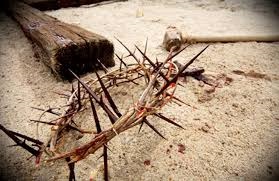Jul. 13, 2018
Interior Pains
"My God, my God, why hast Thou forsaken me?" (Matt. 27:46)
The Prophecy:
Seen in the sun :
After having enjoyed some time of consolations, the infinite goodness of God takes us into a depth of such sufferings that one does not know anymore how to distinguish life from death, grace from tortures. Yet one arrives there.
Divine goodness removes all from us and leaves us sharing but miseries, weaknesses, and imperfections. The greatest pain, is from being deprived from all consolation, as much human as Divine: this is the complete torture.
At this degree, God seems to deprive us of all which, beforehand, was able to console us according to taste and remembrances. God seems to plant death in our hearts, total death, death which, in its sepulchre, sickens all love, all hope, all faith, in a word all that to which we are the most sensitive.
One must then walk, with this cross to the heart, until the instant where God opens again His sun of hope and of strength. God seems to have us as if suspended between life and death… and removes all which can console us, being by the thought of Heaven, being by the remembrance of the beauty of celestial visions. In this exile of the heart, an exile far from God, from the Faith, and from confidence, in this state there is but one supernatural grace which invisibly supports us.
These interior pains are not given except to friends chosen by God. These deep pains do not find a place except in the hearts that God loves.
(7 February 1880)
Footnote [by the author]: Is this short text not an illustration of the gospel which says that the way to Heaven is a narrow path?
[Source: p. 183, Le Ciel en Colloque avec Marie-Julie Jahenny, by Fr. Pierre Roberdel]
Reflection on this prophecy:
The spiritual counsel above is seen by Marie-Julie Jahenny in the sun, which was a ball of light which would appear to her and in which she could see future events.
This ball of light was how the Holy Ghost would communicate with Marie-Julie.
The counsel itself is perfect. It relates the life’s journey of a soul: how a soul will experience consolations, but then will also experience deep suffering, and how both are from the love of God.
The soul is stripped of all which gives comfort: “Divine goodness removes all from us and leaves us sharing but miseries, weaknesses, and imperfections.”
Indeed, all consolations, of any kind which could be relied on before, are no longer available: “The greatest pain, is from being deprived from all consolation, as much human as Divine: this is the complete torture.”
This is surely a process for purification because there is nothing to be done to comfort oneself at all: “One must then walk, with this cross to the heart, until the instant where God opens again His sun of hope and of strength.”
And who can understand the person who is undergoing such constant distaste for life, such a general rejection of everyone and everything? To actually exchange thoughts with such an unhappy person often proves to be difficult and futile. Thus, an exchange becomes a friendly but quick exchange, and then one moves on quickly (to get away).
Indeed, this person becomes alienated from all people and pastimes: “God seems to plant death in our hearts, total death, death which, in its sepulchre, sickens all love, all hope, all faith, in a word all that to which we are the most sensitive.”
The person becomes “suspended between life and death” and even “the thought of Heaven, [or] the remembrance of the beauty of celestial visions” is removed from the memory.
Such a person suffers greatly because it is an “exile of the heart, an exile far from God, from the Faith, and from confidence”.
Indeed, such a person feels utterly alone in his or her suffering, but God is still carrying this soul, for “in this state there is but one supernatural grace which invisibly supports us.”
And God Himself chooses these souls carefully: “These interior pains are not given except to friends chosen by God.”
This reminds one of St. Teresa of Avila complaining to God that if this is how He treats his friends, it is no wonder that He has so few!
But the flame (the Holy Ghost) is telling Marie-Julie a theological truth: “These deep pains do not find a place except in the hearts that God loves.”
Why?
Perhaps the answer is simply that the heart that does not care about whether they love God or not will not suffer when they find their prayer life and even their faith removed.
In other words, we have to love in order to feel pain when we are deprived of that which we love.
But here is the theological point: Why do we love God? Because He loved us first and gave us the gift of loving Him!
This is why the hearts that are chosen to suffer so completely are “hearts that God loves.”
St. John Eudes explains that “we can magnify God by willingly bearing the crosses He sends us for love of Him; for there is nothing that honors Him more than suffering, since our Savior found no means to glorify His Father more excellent than the torments and death of the cross.” [Source: The Admirable Heart of Mary, by St. John Eudes, Part 10, Chapter 3].
So, if we feel privileged by God’s love for us, let us be ready (like good soldiers) and however God wants us to suffer, may we suffer well! Deo gratias!
LINKS: Contemplation Pope Gregory XVII The Few Faithful
"We declare, say, define and proclaim to every human creature that they by necessity for salvation are entirely subject to the Roman Pontiff ." - Decree of Pope Boniface VIII, Unam Sanctam, Nov. 18, 1302, ex cathedra
